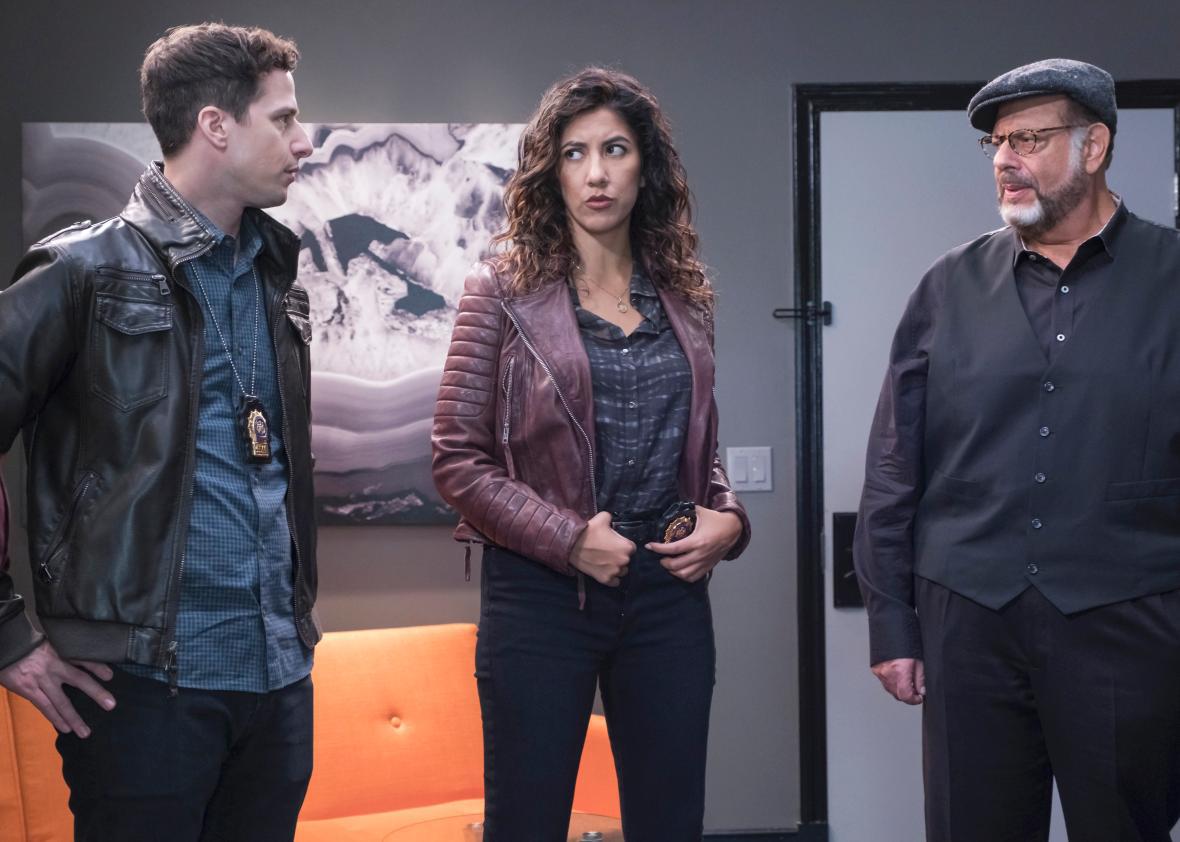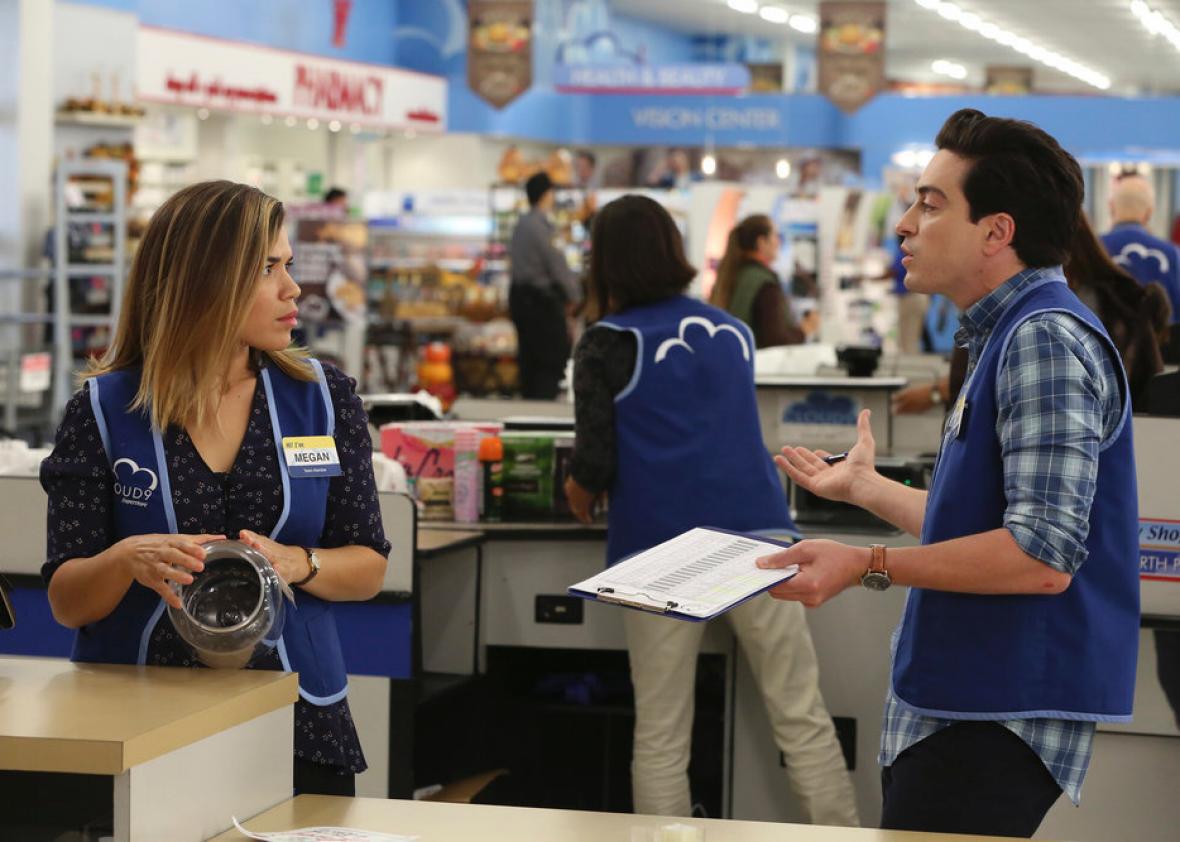Given the current cornucopia of comedy on television, sophisticated viewers have to do some triage. Even professional critics have trouble keeping up with it all, so naturally some things get lost in the shuffle. But the shorthand we use to pare down our queues is imperfect, and it tends to favor prestige comedies: shows that air on cable or streaming sites; shows with short seasons and small casts; shows with surprising hooks and clever plots—in short, television that looks different from old-fashioned network comedies. While Chuck Lorre’s oeuvre, especially the unstoppable Big Bang Theory and its spinoff Young Sheldon, still bring in the highest ratings, traditional sitcoms are often considered as mere escapism, overlooked by critics and sophisticated TV viewers. At the Emmys this year, only two of the seven nominees for Outstanding Comedy Series, Modern Family and Black-ish, were traditional sitcoms—a pattern that has held since 2013. And while Brooklyn Nine-Nine, Superstore, and Fresh Off the Boat are all well-reviewed, they are often damned with faint praise: Pretty good, for a traditional workplace comedy, or a refreshing take on the conventional family sitcom.
You get the sense that there’s a ceiling on just how good a traditionally constructed sitcom can be. Because they don’t have season-long arcs, because they do so many episodes per year, and because they have to service bigger casts, they simply can’t be that innovative or clever. They’re simply too conventional to compete with boundary-pushing shows like Atlanta or Bojack Horseman.
But this perception glosses over the fact that those conventions evolved for a reason, and they often allow traditional sitcoms to tell more resonant stories than more overtly innovative shows. Jokes are only the most obvious such convention. A series like Master of None and Atlanta will often go for entire scenes without anything resembling a joke. In many cases, this makes the dialogue feel more realistic, and can often set up bigger laughs later in the episode. But often, the lack of jokes in prestige comedies feels self-aware, a way of telling you this scene is supposed to be important. On the other hand, the comfortable patter of a sitcom like Brooklyn Nine-Nine allows them to sneak in discussions of issues like the NYPD’s credibility and racial profiling without feeling preachy.
And there’s no guarantee that less conventional writing will necessarily lead to more original jokes. Veep has won three straight Emmys largely on the strength of its distinctive dialogue, but in the most recent season, its operatic insults drifted into lazy, transphobic slurs. That’s an extreme example, but even when it’s not offensive, dialogue on prestige comedies can often feel aimless and self-indulgent. On the other hand, the tight structure of traditional sitcoms means dialogue is rarely wasted, so they don’t drag the way some episodes of prestige comedies like Netflix’s Love or Hulu’s Casual do.

Fox
When a series knows how to employ standard conventions, it can feel familiar and still be original. NBC’s Superstore, which stars America Ferrara and Ben Feldman as big box store employees, may not be groundbreaking in the way of the best prestige comedies, but it can tell stories that few of those shows are telling. By adhering to the predictable environment of a network sitcom—the action rarely leaves the store—the show is able to the capture mundane realities of a boring job or a long-term relationship better than a series with the luxury of being able to film in multiple real-world locations. A number of prestige comedies this year have chronicled breakups and their aftermath (You’re the Worst, Casual, Master of None), but few of them captured the way newly single people have to laboriously reassemble their social lives, as Ferrara’s character Amy has had to on this season of Superstore. It’s not a plot that draws attention to itself, since traditional sitcoms aren’t as dependent on season-long arcs. But the longer season of a network comedy allows the details of Amy’s reconstruction to build gradually, via only a few lines per week. We rarely see Amy’s ex-husband or daughter onscreen, so Superstore can’t capture the intimacy of prestige comedies, but it doesn’t have to—by depicting just this one slice of a character’s life, it can track the tiny changes that accrue over a long time. Such a storyline is only possible because the show has such a big cast and so many episodes—22 per season, more than twice as many as most prestige comedies—to work with.
Prestige comedies can offer revealing stories about specific individuals, but they disproportionately feature characters who are young, white, professional, and living in New York or Los Angeles. Superstore features characters of various identities and, more importantly, allows them to interact with one another, so it doesn’t feel like it’s just ticking demographic boxes with its cast. For example, Matteo, played by Nico Santos, is an undocumented immigrant, but that’s just one small piece of his character. His status occasionally influences the plot, but never more than it needs to, and because the show is committed to traditional joke-writing, it always treats the subject lightly, never sentimentalizing the situation. Superstore has similarly mixed in very funny stories about gun rights, unions, workplace sexual harassment, ableism, and a number of complicated topics it has handled with surprising nuance.
There is a perception that network sitcoms have to shy away from controversial subject matter, but this is mostly a myth. The Carmichael Show and Black-ish received attention for very special episodes about guns and the 2016 election, but even in more mundane episodes, there are few subjects that prestige comedies cover that traditional sitcoms entirely shy away from, although they might handle them in different ways.
Fresh Off the Boat’s storyline about the protagonist’s friend coming out as a lesbian wasn’t as structurally complex as Master of None’s Emmy-winning “Thanksgiving,” but it was able to use that simplicity to its advantage. Telling the story in a more traditional format allowed it to blend into the show’s existing environment. So, on FotB, a 30 second monologue about Tori Amos functions both as a small piece of that storyline and the punchline to a joke in a completely unrelated storyline. In other words, by handling the subject in a less auteur-driven fashion, the traditional sitcom treats it a way that feels mundane and natural, as if it’s just another part of these characters’ universe.
Because these shows are employing conventions everyone’s aware of—intersecting plots, big casts, quick dialogue— it’s easy to miss just how different they have become. There are still cookie-cutter network sitcoms out there, but there are just as many, if not more, that are using the old conventions in new and surprising ways. By starting with something familiar—a family, or a workplace, or a loose group of friends—they can tell storylines that cover a wider range of topics without straying from their core. They are bigger and broader than their counterparts on cable and Netflix, but in a good way—bigger in the perspectives they include, and broader in the stories they can tell. They may look and sound familiar, but network comedies are still going places where prestige TV shows fear to tread.
